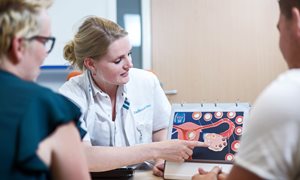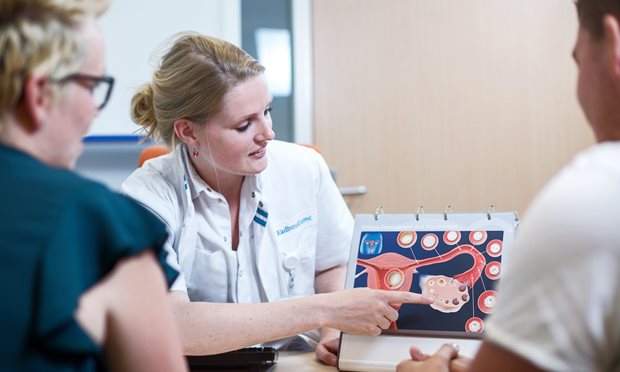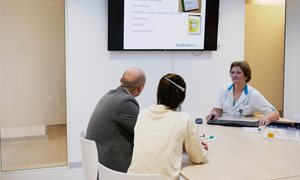

Do you have a question?
On this page you can find frequently asked questions about our examinations and treatments. If you can't find your question here, please contact us.FAQ reproductive medicine

During treatment
-
You can ask urgent questions during nursing telephone consultation hours on weekdays between 8.00 AM and 9.00 AM. Call (024) 361 6644, choose 1, then choose 3. If necessary, the nurse can consult with the physician on the same day. For emergencies, we can be contacted on weekdays and weekends on the emergency phone number. Outside office hours you will be connected to the physician on duty.
-
Yes. On the day of the embryo transfer, you must also insert 3 x 2 vaginal capsules of Utrogestan.
-
Yes. The ovaries become enlarged during the stimulation period. This can cause a swollen lower abdomen, especially in the evening. Some women experience this as a ‘fuller feeling’. You may also experience a stinging sensation in the lower abdomen, especially on the sides. Are you nauseous? Then you should probably increase your fluid intake. We recommend drinking 2 to 2.5 liters per day during the stimulation period and after the puncture.
-
Do you have sudden, or sharp abdominal pain that feels different than the pain during stimulation? And does Paracetamol not relieve the pain? Or do you suffer from nausea/vomiting and have pain in the lower abdomen? Report this immediately on the emergency number of the Department of Reproductive Medicine.
-
We advise abstaining from ejaculation for 1-4 days prior to a treatment.
-
Increased body temperature may have a negative influence on the quality of the sperm. For this reason, it may be better to postpone your treatment until 3 months after the fever has passed. If your husband has temperature above 38.5 °C, then immediately try to reduce the fever with 4 x 2 Paracetamol 500 mg tablets per day. Continue taking the temperature until the fever has passed. Always call for consultation during our nursing consultation hours.
-
Yes, that is allowed with the following instructions. You must use protection during the IVF/ICSI treatment. From the day the puncture is performed up to the embryo transfer, intercourse is not recommended.
If your husband has to produce sperm on the day of the IVF-ICSI puncture or IUI, then pay attention to the abstention period before these treatments. We recommend not ejaculating for 1-4 days before a treatment, so that the sperm quality is optimal on the day of the puncture. If sperm is frozen before treatment, then no abstention period is required.
During other fertility treatments or during a Cryotherapy cycle, you can have intercourse unless you have received other instructions from us. -
This is because not all embryos survive the freezing/thawing procedure. Only good quality embryos survive freezing and thawing. In the fertility laboratory we evaluate this carefully.

After treatment
-
Yes, this might be the case. You may gain a small amount of weight during hormone treatment. A slight weight gain of about 2 kilos can be explained by water retention. The treatment may also affect your eating behavior, so please take extra care to maintain a healthy diet and remember to exercise sufficiently.
-
After an IVF/ICSI puncture you can take a pregnancy test 15 days after the transfer. You can always do this test at home. With a cryotherapy treatment, the exact time of the pregnancy test depends on the treatment schedule; the nurse will give you instructions after the transfer.
-
Even if you have had blood loss or discharge, you must take a pregnancy test on the agreed day and continue the medication as prescribed. This is always the case unless there is no doubt about the menstruation and it continues.
-
Even if you have doubts because of your blood loss, you always need to continue taking Utrogestan. If menstruation continues, you can stop the Utrogestan. You should still test again on the agreed date.
-
You can report the result of a pregnancy test via mijnRadboud, pool VPG CARE.
You can sign up for mijnRadboud at the central desk at the main entrance. You then activate your account at home. -
The first ultrasound examination is scheduled 3-4 weeks after your positive pregnancy test, which corresponds with a gestational age of 7 to 8 weeks. This ultrasound examination is usually performed by your chief practitioner. If the first ultrasound shows no problems, a midwife or gynecologist will take over further your pregnancy checkups.
-
During pregnancy after fertility treatment, your health is even more important than usual. Your health also affects the health of the unborn child. For more information:
-
After a gestational age of 12 weeks you can stop taking the medication immediately.
-
Where can I find information about prenatal screening, including screening for Down syndrome?
This information can be found on the website of Radboud university medical center, and on the websites of the Prenatal Diagnostics Network Nijmegen and the RIVM. -
You decide what happens with your remaining embryos. They can be destroyed or made available for scientific research. Putting embryos up for adoption has been permitted by law since 1 September 2002 (Embryo Act).
At present, there is no procedure for adoption available at Radboud university medical center. However, you are permitted to take the embryos to a center that does offer an adoption procedure. -
In consultation with the chief practitioner, it can be decided to stop treatment, even if fewer than 3 treatments been given. From a medical point of view, all treatments must be responsible and justifiable. It is up to the couple to agree to stop further treatment or to look elsewhere for treatment.
-
Send a written request to our department with your name, date of birth and number given to you by Radboud university medical center. The request must be signed by yourself and your partner. Also include a copy of your passport and that of your partner. Requesting your medical file can take 1-2 weeks.
Send the request to:
Radboud university medical center
Secretariat Obstetrics and Gynecology
In-house mail 791
6500 HB Nijmegen

